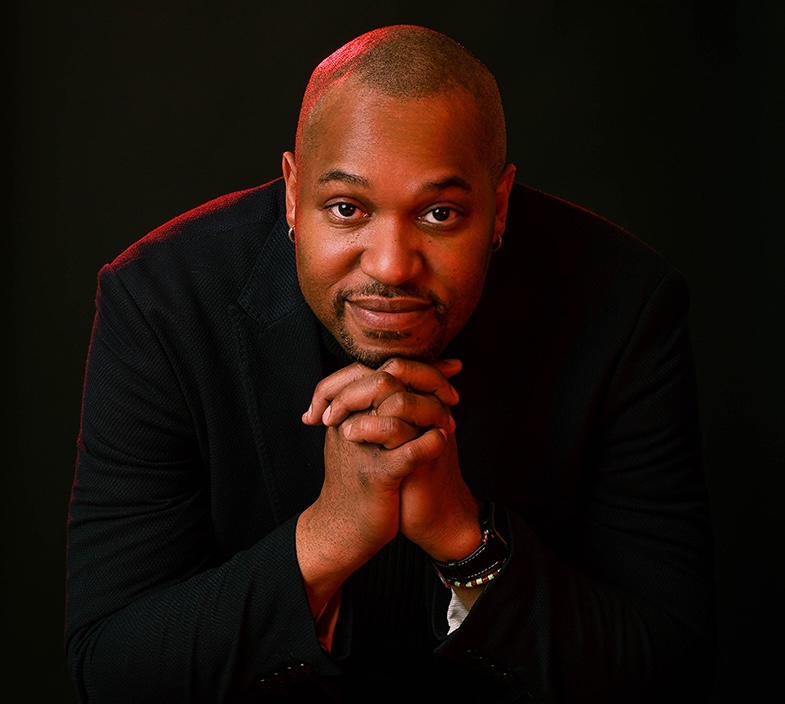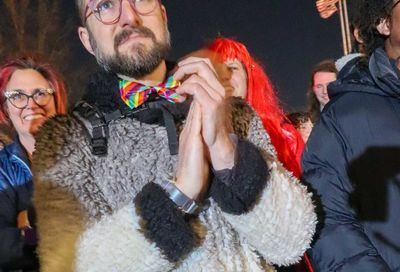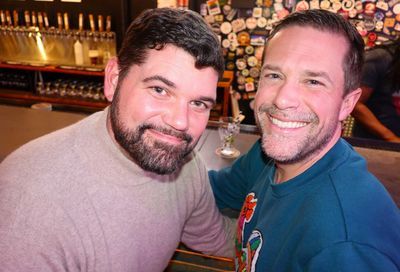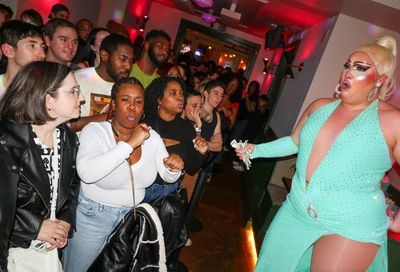Marching On
As the door to MMM participation closes for the black LGBT community, another door to increased activism may be opening
Washington, D.C., is no stranger to mass gatherings of people seeking rights, justice, or just a chance to be heard. Saturday, Oct. 15, was one of those historic moments. But as a promise for Keith Boykin to address the Millions More Movement (MMM) gathering was broken at the last moment, no one could forget that D.C. is also a city of raw — often painful — politics.
The ”We Are Family – Unity Weekend” was months in the making. As organizers for the MMM began crafting a 10-year anniversary event of 1995’s Million Man March, leaders of the African-American GLBT community began crafting their own parallel event. For a moment, in the shadow of the Capitol, both events were one in the same. That moment, however, was not an easy marriage. Rather, it was the result of several powerful personalities, political conflict, and a black GLBT community that is refusing to be ignored.
The Unity Weekend and MMM commemoration have ended, and the results remain uncertain. To grasp the importance of Saturday’s events, to theorize what may happen next, a brief retelling of the events of the past few months is in order.
 (Click for more pics) (Click for more pics) |
Seat at the Table?
For months, the question had been whether the black gay community would be welcomed into the MMM commemoration. There were mixed signals. Minister Louis Farrakhan, leader of the Nation of Islam and organizer of the MMM, had been making seemingly gay-friendly, inclusive statements about the nature of the commemoration. In the past, he’d been less friendly, making statements such as ”no effeminate will get in the Kingdom,” according to the Anti-Defamation League, which monitors defamation of Jews and others.
Closer to home, D.C.’s own Rev. Willie Wilson was named national executive director of the MMM event. Wilson had shown himself in the past to be on somewhat friendly terms with the gay community. ”Just five years ago, the reverend held a service to bring the black community together over gay issues,” said Donna Payne, in a July statement issued by the Human Rights Campaign. Payne is the organization’s senior diversity organizer, as well as vice president of the National Black Justice Coalition (NBJC), the sole national organization dedicated to advocating for members of the black GLBT community.
But when the official announcement of the MMM event was made at a May 2 press conference, the NBJC was not there.
”When the organizers of the march had their initial press release and we weren’t invited, we sent letters to Rev. Wilson and other organizers and didn’t get a response,” Ray Daniels, NBJC communications director, explained at the time. ”Then we decided to have a pre-march rally.” It was then that the NBJC reserved Freedom Plaza for an Oct. 15 rally. Whether they’d be celebrating inclusion in the MMM event, or protesting the lack thereof, remained to be seen.
The D.C.-based NBJC, along with a local grassroots alliance of leaders from the black gay community — meeting under the banner of the D.C. Coalition, but not as an official component of that group — led the charge to be included in the MMM event. Eventually, both groups honed a specific demand: They wanted two speakers on the main stage to represent the black GLBT community — one male, one female.
But whatever initial optimism remained after MMM organizers declined to include NBJC in the May 2 announcement took a direct hit in July when Wilson delivered scathingly homophobic sermon at his Union Temple Baptist Church in Anacostia. Local gay activist Phillip Pannell delivered a recording of that sermon to local media, allowing everyone a chance to hear Wilson say ”lesbianism is about to take over our community,” and other such sentiments.
Wilson’s sermon caused a firestorm within the community and, presumably unintentionally, galvanized the local black GLBT community in its efforts to be heard come Oct. 15. As Wilson remained unapologetic, publicly condemning ”negro spies” for disseminating his homophobic sermon, D.C. City Council members and other local leaders began making appearances at the monthly grassroots meetings led by Pannell, D.C. Coalition leaders Carlene Cheatam and Sterling Washington, and others.
As Oct. 15 neared and Wilson showed no signs of apologizing, Farrakhan made his own overture to the gay community. ”I cannot fault a gay person or lesbian person who stands on their platform to preach what they believe of self and how the world should view them,” he wrote, in part, in an August issue of The Final Call, official newspaper of the Nation of Islam. ”[W]e must not allow painful utterances of the past or present…to cripple a movement that deserves and needs all of us — and when I say all, I mean all of us.”
The fog created by the mixed MMM signals finally began to clear in the last week before the Oct. 15 event. Farrakhan and Wilson met with NBJC’s President Keith Boykin, Executive Director H. Alexander Robinson, and Payne. While attendees report that Wilson still displayed a measure of hostility at that meeting, Farrakhan greeted them warmly. And a compromise was met: Boykin would be given a spot to address the crowd from the MMM main stage.
”It is our most sincere hope that this portends a new chapter in the story of how we liberated our community from the prison of homophobia,” Robinson said in an Oct. 13 NBJC statement announcing the news.
Day of Reckoning
 Payne and Boykin (Click for more pics) Payne and Boykin (Click for more pics) |
On Saturday morning, Oct. 15, following the successful opening reception for the Unity Weekend at Us Helping Us the night before, Robinson walked grimly about Freedom Plaza, looking like a man whose hopes had been dashed. ”You’ve heard the news, haven’t you?” he asked.
The news was not good. Payne and Boykin reported to the MMM event early that day, only to learn that Boykin would not be speaking. Payne said that Wilson cited an ambiguous procedure for the reason Boykin was pulled from the lineup. ”[Wilson] smiled and said, ‘You will not be speaking today,”’ Payne told those gathered back at Freedom Plaza. ”I’m so angry.”
As the marquee at National Theater touted Les Misérables across the street, the small Freedom Plaza crowd of about 200 soldiered on.
”You see we still have challenges, but you see how we’ve lifted the community up for the past nine months,” Cheatam told the group. ”The fact that I am black, that I am lesbian, is all good…. I’m brave enough to believe they can’t make it without us.”
The speeches went on, with nearly two dozen speakers, most of whom amended their words to reflect the new reality of the morning’s news.
 Cheatam (Click for more pics) Cheatam (Click for more pics) |
”I had a very different speech prepared,” Sterling Washington began. ”Today is not an end. It’s a beginning…. Rev. Willie Wilson is a snake in the grass. If he wants a fight, then a fight he will get.”
The rally came to a poignant close with Boykin offering the speech of gratitude and optimism he had planned to deliver on the Mall.
”We share the same goals and aspirations as the rest of the black community,” Boykin read aloud. ”But none of us can accomplish those goals without unity and courage. We all need courage in our lives. It took courage for you to come here today. It took courage for Minister Farrakhan to invite me to speak today. And it will take courage to heal the wounds that have divided us for far too long.”
While that should have ended the rally, the gathered group still had a collective need to make a statement. ”We have a chance here to do something,” Boykin told the crowd, no longer reading from his prepared speech. ”We are going to continue marching. We are going to march down to that Mall.”
Shortly thereafter, the plaza emptied and a crowd of about 70 fell in line behind the NBJC banner for a march down Pennsylvania Avenue toward the MMM event stage in front of the Capitol. Though impromptu, Sgt. Brett A. Parson, head of the D.C. Metropolitan Police Department’s Gay and Lesbian Liaison Unit was on hand to provide a vehicular police escort for the marchers. As they marched, the crowd chanted several phrases like, ”We’re black! We’re gay! We’re family!”
As the march neared the Capitol, the sidewalks became dense with MMM attendees. Some sneered, some cheered, but no one got in this group’s way. While in the thousands, the number of people at the event fell short of the Million Man March a decade ago. Organizers of the event could not be reached by press time for an estimate.
But the shortfall was evident to three women downtown for the commemoration. Seeing the gay group marching up Pennsylvania Avenue, and learning of Wilson’s apparent role in the action, Vickie Clarke of D.C. concluded, ”That’s why they don’t have the turnout,” pointing to Wilson as creator of a rift that hurt overall attendance.
”That’s what we’re fighting for,” added Clarke’s friend, Cecilia Holt, criticizing discrimination from within the African-American community.
Clarke, Holt and Tara Montgomery, all with the anti-violence group Forgiving Mothers Straight From The Heart, suggested that Wilson either apologize or step down.
Once at the Capitol grounds, the GLBT group slowly passed through the strict security cordon, passing one large rainbow flag and a similarly sized version of the recognized, Afrocentric red-black-green flag through the metal detectors. Once inside, however, the Capitol Police laid some ground rules.
”We can join [the event], but we can’t chant,” Payne instructed the group. ”That would be perceived as a counter-protest.”
The group was nevertheless heard, heading to the media tent, providing ample opportunity for leaders of the group to get their message out via a number of press interviews, as they mingled with gay-supportive political leaders, Rev. Al Sharpton and Rev. Jesse Jackson.
”Visibility is so important,” said Payne, standing near the front of the crowd and acknowledging that he moment was historic. ”It sends a message just to stand here.”
 (Click for more pics) (Click for more pics) |
Fear of a Black Gay Movement
While Boykin did not make it to the MMM stage, Cleo Manago of the Black Men’s Xchange (BMX) did. Manago and BMX don’t identify as ”gay,” preferring ”same-gender-loving” (SGL). While assessing the weekend, that may be seen by some as a victory for the African-American GLBT community. For others, Manago’s inclusion simply allows MMM organizers to defer criticism of Boykin’s exclusion.
”Our major demand was a gay and a lesbian speaker,” says Cheatam. ”Whatever [Manago] is calling himself, he is in the gay community. On some level, I can understand how the representatives of the Nation of Islam are more comfortable with him, but I don’t know how he represents lesbians or transgender persons. If you’re not representing the whole community, it’s still lacking.”
 Pannell (Click for more pics) Pannell (Click for more pics) |
Like Cheatam, Pannell — who says Manago ”doesn’t represent us at all” — has been a fixture in D.C. gay politics for years, be they black or any other color or creed. Saturday’s events may have been the capstone on his cynicism.
”There is a range of emotions: disappointment, hurt, anger,” says Pannell. ”To be quite honest, of all the folks, I should be the most stoic because since the very beginning, I said I didn’t trust these people. Sure enough, [my suspicions] became reality. But it still hurts.”
That said, the media tent was rolled up days ago. Millions More Movement organizers promise that MMM is to be on ongoing mission. The D.C. Coalition and NBJC are committed to their ongoing missions as well. So what happens next?
Within the D.C. Coalition-NBJC mix of African-American GLBT leaders, there is some difference of opinion about Farrakhan’s and Wilson’s roles in Boykin’s exclusion, and whether Farrakhan, at least, may be friend rather than foe.
As Boykin said Oct. 15, ”Minister Farrakhan has kept his word with us. Willie Wilson has been the problem…. There is a distinction between these two men.”
Pannell is not so sure. ”I believe they were playing good cop, bad cop,” he surmises. ”Farrakhan talks about reconciliation and healing, while you have Rev. Wilson as a fulminating pit bull. I think this was all very well scripted and by design.”
Wilson did not respond to a Metro Weekly request for comment.
Washington, who reckons that either the D.C. Coalition or the Unity Weekend Outreach Committee, which he also heads, will soon make a statement regarding a course of action in light of Oct. 15, says the ball is in Farrakhan’s court. ”Farrakhan needs to make some public statement about what happened and remove Willie Wilson as national executive director of the MMM. Otherwise, my initial conclusion that Farrakhan was conscious of this double-cross will be validated.”
Cheatam says there may even be a chance for Wilson to regain some of the standing he once had within the gay community. ”He is showing that he is in a lot of pain, and I don’t know where that pain is coming from…. There was a time when he could claim a certain posture, but he’s hurt himself with his parishioners and with other people in the city. He can recover, but he has to acknowledge that he has done wrong. He has to apologize.”
Pannell says that he thinks, however, that Wilson is a lost cause: ”Short of an exorcism, I can’t see how we can have any real dialogue.”
There is an upside to Wilson’s apparent homophobia, however. As his vitriol galvanized the black gay community in July, he may be doing so again. At the least, African-American gay leaders agree that the Unity Weekend was a success.
”He’s caused a lot of ire. As a result, a lot of people on the fence really decided to get involved. In a sense, Willie Wilson is one of the best things to happen to the black gay community in D.C.,” says Washington, adding that while Wilson has prompted action in the past, he hopes it will do so in the future, as attendance at the rally was lower than what he had hoped for. ”Ideally, we would’ve had 2,000. It’s not because people didn’t know. I’d been doing outreach all week. I think a lot of people were sort of fed up and frustrated with the entire process.”
Pannell, who declined to join the march to the Mall, saying he was too angry, hurt, disgusted and tired at that point, still found success in the weekend. ”It brought people together,” he says. ”It showed the diversity of the community. People were politically engaged with this.”
Though Oct. 15 has come and gone, that engagement cannot end, warns Cheatam. After all, while issues of African-American civil rights and the African-American GLBT community will play themselves out all over the country, D.C. is unique. Wilson, the NBJC and the D.C. Coalition all call this city home.
”What happens in D.C. goes national,” she reasons. ”It’s up to D.C. to keep the fires lit, keep the issues raised. We have to speak for those that don’t have voices, in all parts of the country….
”I’m of the opinion that the efforts of the last month were not a waste of time. It enabled us to come together and start the dialogue about homophobia and oppression in the community. We have work to do. It’s just the beginning.”
Keith Boykin has posted the entirety of his planned MMM speech at www.keithboykin.com. For more information about the NBJC, visit www.nbjcoalition.org. For more information about the D.C. Coalition, send an e-mail to dccoalition78@hotmail.com.
Support Metro Weekly’s Journalism
These are challenging times for news organizations. And yet it’s crucial we stay active and provide vital resources and information to both our local readers and the world. So won’t you please take a moment and consider supporting Metro Weekly with a membership? For as little as $5 a month, you can help ensure Metro Weekly magazine and MetroWeekly.com remain free, viable resources as we provide the best, most diverse, culturally-resonant LGBTQ coverage in both the D.C. region and around the world. Memberships come with exclusive perks and discounts, your own personal digital delivery of each week’s magazine (and an archive), access to our Member's Lounge when it launches this fall, and exclusive members-only items like Metro Weekly Membership Mugs and Tote Bags! Check out all our membership levels here and please join us today!


























